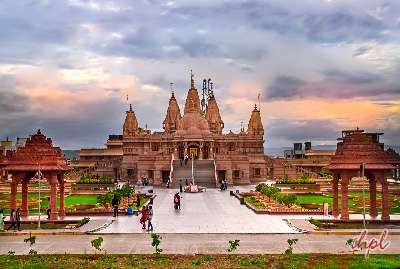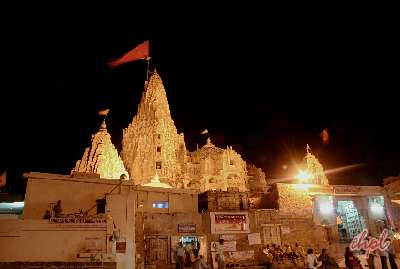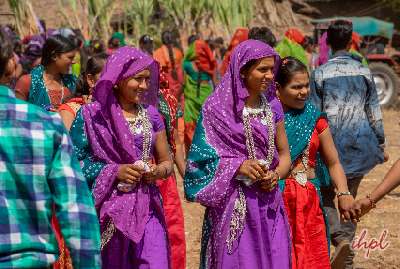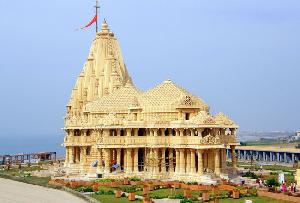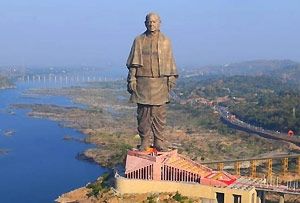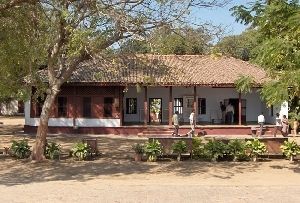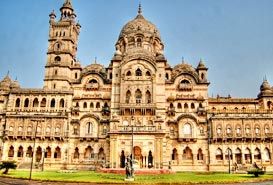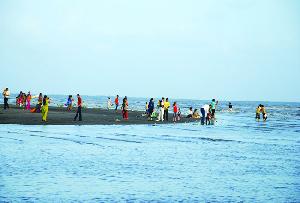The culture of Gujarat forms an integral part of Indian culture. Even with extensive modernization, Gujarat and its people have been able to preserve the culture and tradition of the ancient past. Noted for their colorful dresses, the people of Gujarat – popularly known as ‘Gujaratis’ – exhibit a warm and friendly nature, and the ‘untouched’ simplicity about them constitutes an integral part of the beautiful culture of Gujarat.
Gujarat boasts vibrant art, architecture, and culture, which is reflected in the day-to-day lives of the local populace. The amiable and peace-loving Gujaratis are well known for their concern and affection for all life forms.
Most of the art traditions and cultural heritage of Gujarat can be traced back to the ancient period of Lord Krishna. The Gujaratis exhibit a natural penchant for singing and dancing. They have special songs and dances for every occasion and festivals celebrated all around the year. They have, till date, successfully preserved Gujarat’s rich song, dance, and drama tradition.
Let’s look at the features that make the culture of Gujarat flourish.
Beliefs of Gujaratis
Gujaratis have many beliefs and worship gods and goddesses. For example, they honor the cows as they give us milk and call them “Gau Mata”. In addition, the population in Gujarat has Hindu beliefs, Jainism, the bhakti movement, Zoroastrianism (an Iranian religion), and Gujarati Muslims. The life cycle ceremonies are carried out by Brahmans, where the most significant ones include bird, and thread ceremonies, marriage, and death. They also celebrate the ‘Festival of Lights’ – Diwali and Navratri (the night of nine nights).
People of Gujarat
Several ethnic groups showcase the cultural diversity of Gujarat. These groups are further classified as Indic (northern-derived) and Dravidian (southern-derived). The Indic group constitutes – Bhatia, the Nagar Brahman, Bhadela, Rabari, and Mina castes. On the other hand, the Dravidian group comprises tribes like Dubla, Naikda, Macchi-Kharwa, Bhangi, and Koli. The rest of Gujarat’s population, like the native Bhil tribe, has mixed characteristics.
Around one-fifth of the population consists of Scheduled Castes, mostly living in Ahmedabad. Further, about 70% of the Gujaratis are Hindus, and the rest are Jains and Muslims. And nearly one-third of the total populace is urbanized.
Gujarati culture is varied, and that can be seen in the traits of the people living in different regions of the state. For instance, those living in Kutch, an arid region, are hardy by nature but blessed with a spirit of enterprise for business organization. Another example is the people of peninsular Saurashtra, known for their artistic skills. The Gujaratis in the northern part of the state are simple and more practical. In contrast, southern Gujaratis are gentle and loving.
Languages of Gujarat
Gujarati is the mother tongue of the Gujarat people and is widely spoken. This language is an Indo-Aryan language with its root in Sanskrit. Gujarati is the 26th most used language in the world and has about 11 distinct dialects. Also, the state shares a border with Madhya Pradesh, Maharashtra, and Rajasthan. Thus, a small sect of people speaks the native languages of the neighboring states like Hindi, Urdu, Sindhi, Marwari, and Marathi. Another significant language of Gujarat is Kutchi or Kachhi, spoken by the people living in Kutch.
Art of Gujarat
Art is a huge part of the culture of Gujarat. The vastness of handcrafted products in this state is known worldwide. The intricate Gujarati art forms include jewelry, furniture, leatherwork, metalwork, embroidered garments, mirror work, baked clay items, and so much more. Not only this, but the state also produces some of the most elegant furnishings like bed covers, cushion covers, table mats, and quilts. Daily patterns are also woven on the Patola sarees with precision.
Explore 7 Days Gujarat Wildlife Tour Package
Gujarati Music
You might have heard Gujarati Music, especially on the holy days of Navratri. People dance to traditional songs and perform Garba, a traditional dance form about which we will discuss more. In addition, there are several rags, which originated in Gujarat only and included Gujari Todi, Bilaval (from Veraval), Sorathi, Khambavati, Ahiri, and Lati. These rags are also used in classical Hindustani music.
Music is an essential part of the culture and tradition of Gujarat that the people have preserved for centuries. Rann Utsav is a significant festival in this state that brings rich Gujarati music into the ears of Indians and foreigners who attend this festival. Charans and Gadhavis are communities that keep their music alive and carry on Gujarati folk music lineage. Lullaby, Nuptial, and festive songs are some common Gujarati folk songs.
Browse through our Gujarat Tour Packages from Pune, Dwarka Tour Package from Kolkata
Gujarat Dance Forms
You are probably living under a rock if you haven’t heard of the dance form of Garba. Gujaratis love it! Ras and Garba are the two most popular dance forms in Gujarat. Tippani Nritya, Padhar Nritya, Siddi Dance, Dangi Nritya, and other local tribal dances are quite famous. If you are interested in folk drama, then Bhavai is the way to go.
Dandiya Raas is a popular dance form of Gujarat that requires you to be energetic and playful. The men and women perform this dance, dressed beautifully in traditional clothes. They move in concentric circles while clicking their “dandiyas” or bamboo sticks that they hold in either hand with each other.
Next, Garba is a traditional dance form in which women gracefully dance in a circular form. It is performed to offer reverence to Goddess Ambaji. Garba involves dancing rhythmically while clapping the hands and moving around the goddess. The dresses women wear while performing Garba are exquisite, like embroidered Ghagra, cholis, bracelets, anklets, and more.
Fairs and Festivals of Gujarat
Gujarat’s people are high-spirited and love to celebrate fairs and festivals. If you ever get a chance, attend any of the festivals mentioned below to get a deep insight into Gujarati culture.
- Bhavnath Mahadev Mela – Celebrated in February at Bhavnath Mahadev Temple in Junagadh.
- Chitra Vichitra Mela – Celebrated in March by around 60,000 to 70,000 tribal people.
- Makar Sankranti – Celebrated in January, also called the Kite Flying festival.
- Bhadra Purnima – Celebrated in September on the full moon days with folk performances.
Gujarati Culture Dress
Nowadays, almost all people wear western clothing. But the traditional dresses of Gujarat are gorgeous. The men and women wear beautiful dresses on special occasions, and women wear silver jewelry with intricate details.
Traditional dresses of Gujarati men include Chorn, Kediyu, Dhoti, Kurta, and Phento. Adults wear a gold ring and a gold chain. On the other hand, traditional dresses of Gujarati women include Ghagra Choli or Chaniya Choli, Chaniyo, and saree. Married women wear Mangal Sutra, bangles, earrings, nose rings, and necklaces. And unmarried women wear small hoop earrings called balis and even nose rings or studded nose jewelry. Bindi and sindoor are essential for married women.
While performing Raas Garba, which is performed to reenact the Raas Leela or the dance of Lord Krishna, women wear chaniya choli or ghagra choli with a kamarbandha (colored waistband). Men wear churidars (tight trousers) and keviya (tight long-sleeved coats plaited with frills).
Culture Food of Gujarat
Gujarati cuisine is known worldwide. From dhokla to fafda, most people have tried one or two items from Gujarat. Here is a list of the top foods in Gujarat that are a huge part of Gujarati culture.
- Khandvi
- Undhiyu
- Aam Shrikhand
- Fafda
- Dhokla
- Gujarati Kadhi
- Basundi
- Thepla
Check out Gujarat Tour Packages, Kutch Tour packages, Vadodara Tour Packages, Mandvi Tour Packages, Sasan Gir Tour Packages, Porbandar tour packages, Somnath Tour Packages, Bhuj Tour Packages, Rann of Kutch Tour Packages



